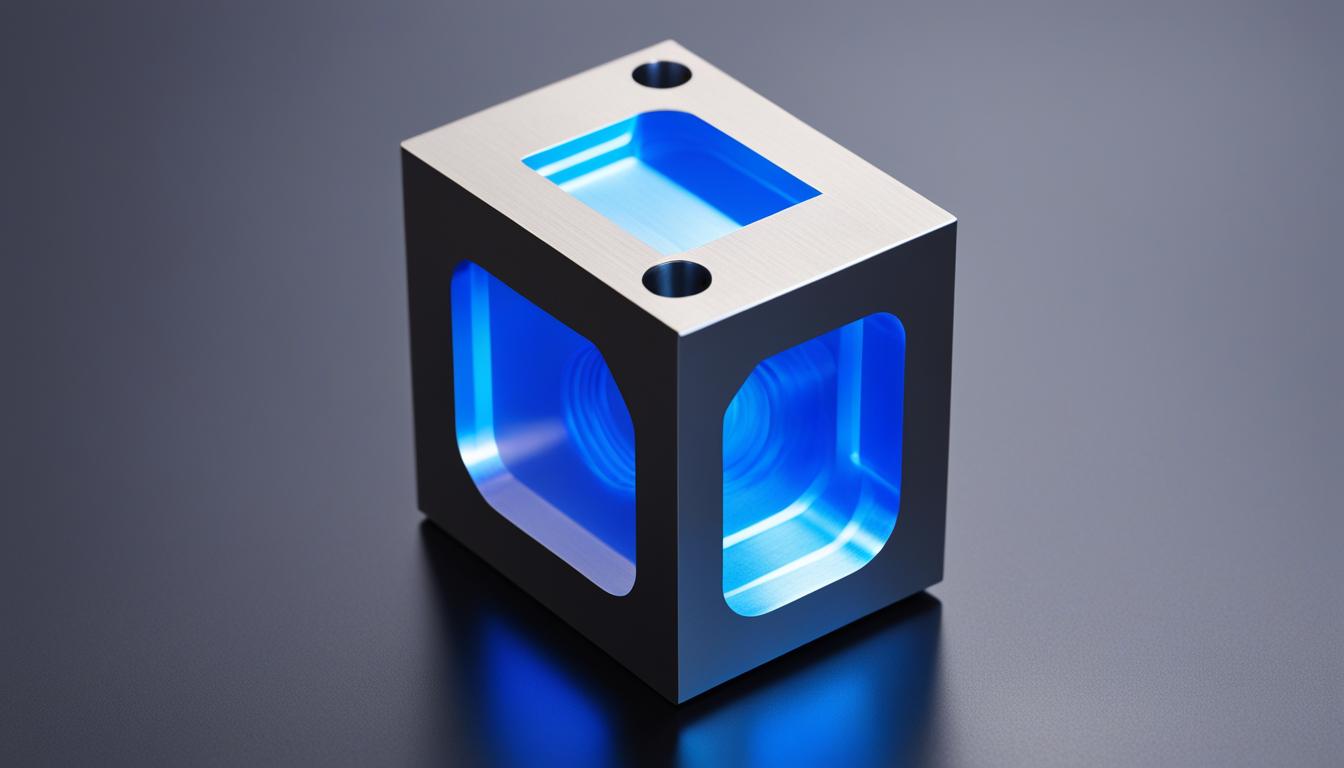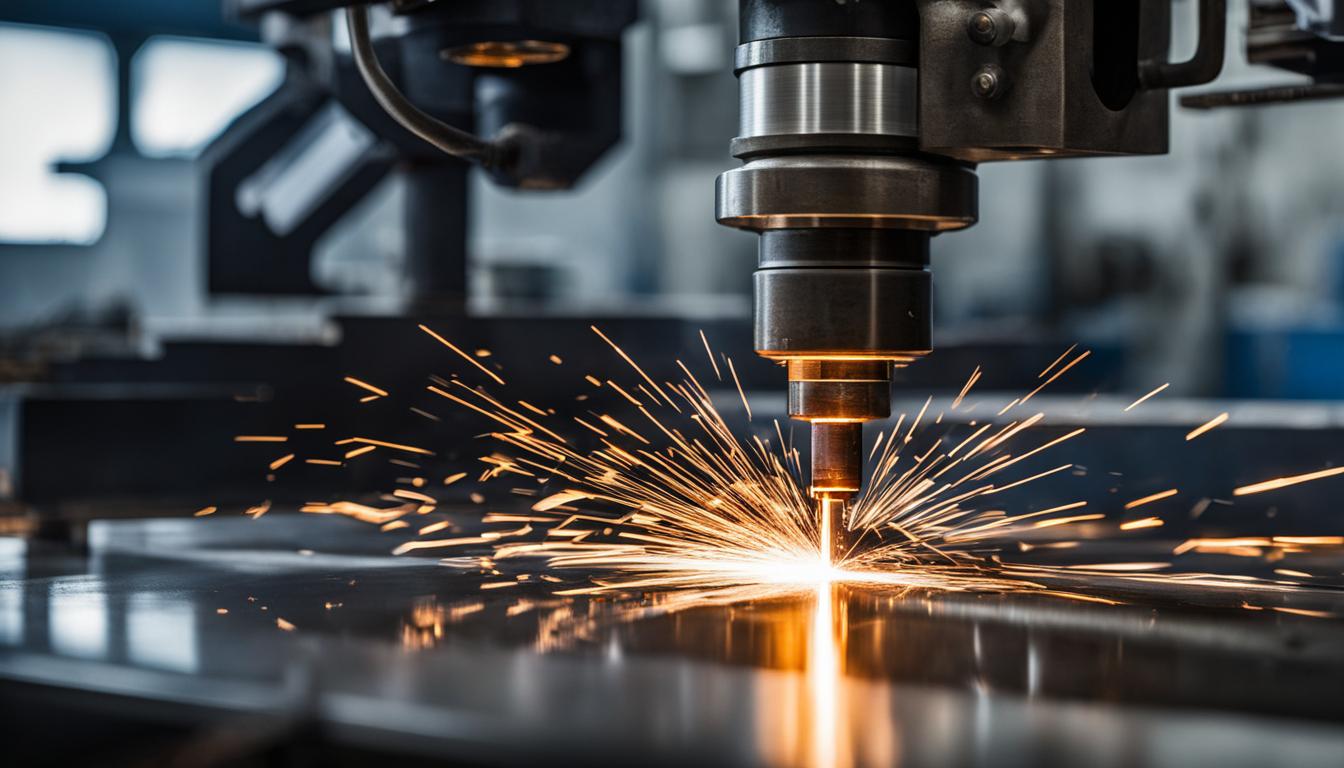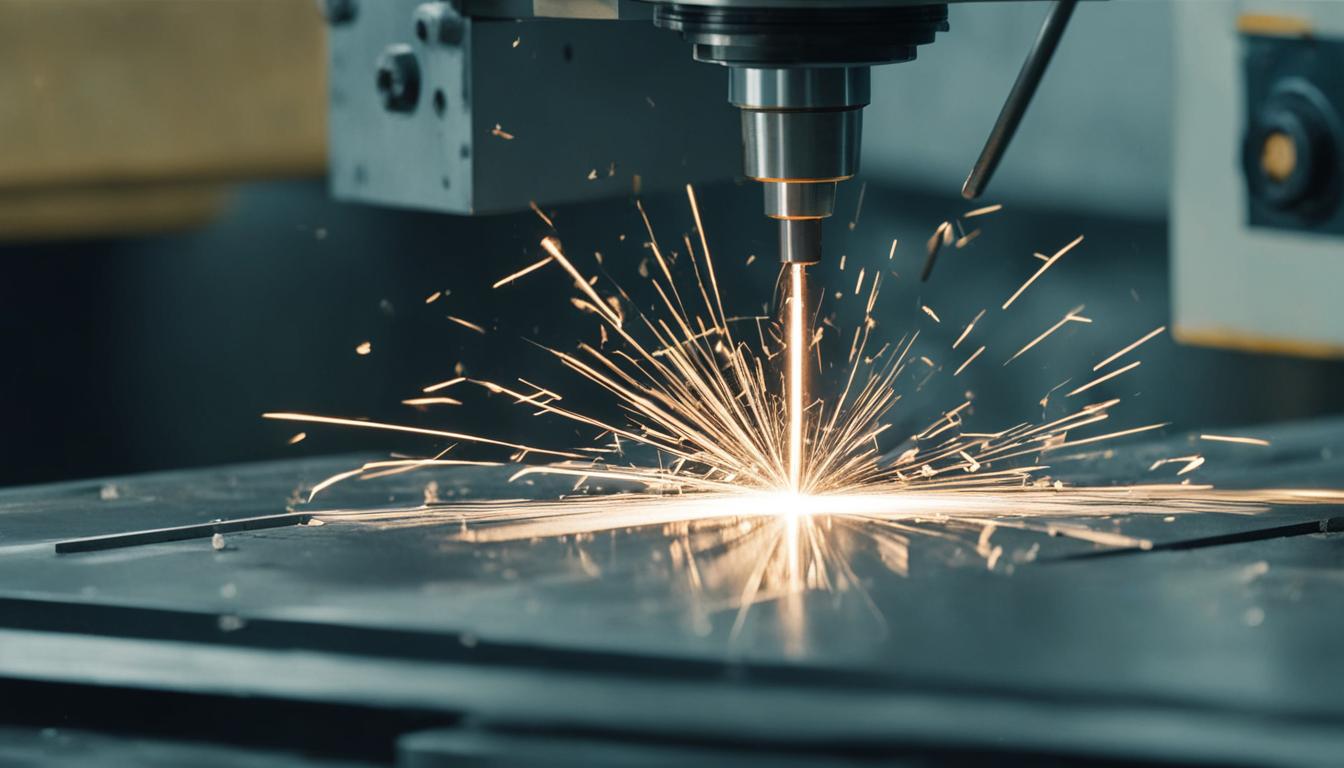CNC machining offers a wide range of options for creating precision-manufactured components using different metals. However, each metal has its own unique properties that affect its suitability for CNC machining. Let’s explore some of the best metal types for CNC machining and their various properties.
Key Takeaways:
- Steel is a versatile metal for CNC machining, offering moderate strength and machinability.
- Aluminum is an economical option due to its availability and ease of machinability.
- Copper is a high conductivity metal suitable for projects requiring heat and electrical conductivity.
- Titanium is lightweight and strong, making it ideal for industries that prioritize strength and corrosion resistance.
- Bronze, brass, and various plastics also have their unique properties that make them suitable for CNC machining.
Steel – A Versatile Metal for CNC Machining
Steel is one of the most commonly used metals in CNC machining due to its moderate strength and machinability. It offers a wide range of applications across various industries, making it a versatile choice for manufacturers.
Types of Steel for CNC Machining
When selecting steel for CNC machining, it is essential to consider the specific requirements of the project. Different types of steel alloys offer varying mechanical properties, machinability, and corrosion resistance.
Stainless Steel
Stainless steel is a popular choice for its excellent corrosion resistance and high tensile strength. It is commonly used in industries such as automotive, aerospace, and medical, where resistance to rust and other forms of corrosion is crucial. However, stainless steel can be more expensive compared to other types of steel alloys.
Carbon Steel
Carbon steel is a cost-effective option for CNC machining projects. It offers good strength and toughness, making it suitable for producing small, strong mechanical parts, bolts, gears, and shafts. However, it is important to note that carbon steel needs to be surface treated to prevent corrosion and rust.
| Steel Alloy | Mechanical Properties | Machinability | Corrosion Resistance |
|---|---|---|---|
| Stainless Steel | High tensile strength | Good | Excellent |
| Carbon Steel | Good strength and toughness | Good | Requires surface treatment |
Choosing the right type of steel for CNC machining depends on the specific requirements of the project. Whether it’s the need for corrosion resistance, high tensile strength, or cost-effectiveness, considering these factors will help achieve optimal results in CNC machining projects.
Aluminum – An Economical CNC Machining Option
When it comes to CNC machining, aluminum is a highly sought-after metal due to its economic availability and excellent machinability. Its versatility and wide range of applications make it a popular choice among both hobbyists and professionals in various industries.
One of the main advantages of aluminum is its cost-effectiveness. Compared to other metals used in CNC machining, such as titanium or stainless steel, aluminum is relatively inexpensive and readily available. This makes it an ideal choice for projects with budget constraints.
Furthermore, aluminum can be easily alloyed with other elements like copper, iron, silicon, and magnesium to enhance its properties for specific applications. These alloys offer a wide range of mechanical and physical characteristics, allowing engineers and designers to tailor the material to meet the requirements of their projects.
Its lightweight nature also makes aluminum a preferred choice, especially in industries such as automotive, aerospace, and consumer electronics. The use of aluminum components helps reduce overall weight, contributing to fuel efficiency and improved performance.
Here is a table highlighting some key properties of aluminum alloys commonly used in CNC machining:
| Alloy | Tensile Strength (MPa) | Heat Resistance | Corrosion Resistance | Applications |
|---|---|---|---|---|
| 6061 | 276 | Good | Excellent | Aerospace components, automotive parts, consumer electronics |
| 7075 | 572 | Excellent | Good | Aerospace components, bicycle frames, sporting goods |
| 2024 | 455 | Good | Good | Aircraft structures, automotive parts, precision instruments |
As seen in the table, different aluminum alloys offer varying strengths, heat resistance, and corrosion resistance to suit specific project requirements.
For those looking to optimize the machining capabilities of aluminum, it is essential to work with experienced CNC machining experts who have in-depth knowledge of the material’s behavior and can suggest the most suitable alloy for your project.
Copper – High Conductivity Metal for CNC Machining
Copper is a highly sought-after metal in the field of CNC machining due to its exceptional heat and electrical conductivity. While it may come with a higher price tag compared to other metals, its unique properties make it a preferred choice for projects that require superior conductivity.
When it comes to CNC machining materials, copper stands out for its ability to efficiently transfer heat and electricity, making it suitable for a wide range of applications. Whether it’s creating electrical components or high-performance heat sinks, copper’s conductivity ensures optimal performance and reliability.
One notable advantage of working with copper in CNC machining is the clean and polished appearance it offers after the milling process. This makes it an excellent choice for projects where aesthetics and precision are crucial.
The medical industry, in particular, relies heavily on copper for its antimicrobial properties. Copper alloys, such as brass and bronze, are commonly used in medical equipment and implants, where cleanliness and biocompatibility are of utmost importance.
In addition to its electrical and thermal properties, copper exhibits excellent machinability, allowing for intricate and precise CNC milling. However, it is important to note that copper’s softness can pose challenges during the machining process, such as the risk of burrs or deformation. Skilled CNC machinists employ appropriate techniques and tooling to overcome these challenges and deliver high-quality copper components.
Advantages of Copper for CNC Machining:
- High heat and electrical conductivity
- Clean and polished appearance
- Antimicrobial properties for medical applications
- Excellent machinability with skilled techniques
| Properties | Advantages |
|---|---|
| High heat conductivity | Efficient thermal management |
| High electrical conductivity | Optimal performance for electrical components |
| Clean and polished appearance | Enhanced aesthetics for precision products |
| Antimicrobial properties | Applicable in medical equipment and implants |
| Good machinability | Allows for precise CNC milling |
Titanium – Lightweight and Strong CNC Machining Material
Titanium is a highly sought-after material for CNC machining due to its exceptional strength-to-weight ratio, making it a favorite choice in various industries. With a density of 4.51 grams per cubic centimeter, titanium is nearly half the weight of steel, but it boasts excellent mechanical properties. Its superior strength, coupled with its low weight, makes titanium a desirable option for applications that require both durability and lightweight components.
However, it’s important to note that titanium can be more challenging to machine compared to other metals. Its exceptional strength and hardness can lead to increased tool wear during the machining process. Additionally, titanium has a lower thermal conductivity than steel, which poses challenges when managing heat generated during CNC machining. These factors contribute to higher machining costs and longer processing times.
Despite the challenges, titanium’s unique properties make it a valuable material in industries such as aerospace, military, and medical. Its corrosion resistance is particularly advantageous, making it suitable for components exposed to harsh environments where protection against corrosion is critical.
To demonstrate the properties and advantages of titanium in CNC machining, refer to the following table:
| Titanium Alloy | Density (g/cm3) | Ultimate Tensile Strength (MPa) | Yield Strength (MPa) | Elongation (%) |
|---|---|---|---|---|
| Grade 5 (Ti-6Al-4V) | 4.43 | 900 | 800 | 10 |
| Grade 2 (Commercially Pure) | 4.51 | 345 | 275 | 24 |
| Grade 23 (Ti-6Al-4V ELI) | 4.43 | 900 | 800 | 10 |
Properties of common titanium alloys used in CNC machining
The table above provides insights into the density, ultimate tensile strength, yield strength, and elongation of commonly used titanium alloys in CNC machining. These properties vary depending on the specific grade of titanium alloy used. Understanding these characteristics helps select the most suitable titanium alloy for specific machining requirements.
Titanium’s remarkable combination of strength, corrosion resistance, and relatively low weight has positioned it as a preferred choice for CNC machining, despite its challenges. The aerospace industry extensively relies on the outstanding properties of titanium for manufacturing structural components, engine parts, and aircraft frames. Similarly, the military and medical sectors benefit from titanium’s strength, biocompatibility, and resistance to corrosion.

Bronze – Corrosion-Resistant Metal for CNC Machining
Bronze is a highly sought-after metal in the field of CNC machining due to its excellent corrosion resistance properties. It is a versatile material that contains high levels of iron, zinc, and tin, making it suitable for a wide range of applications in various industries.
Properties of Bronze
Bronze possesses several desirable properties that make it an ideal choice for CNC machining projects:
- Corrosion resistance: Bronze is known for its exceptional resistance to corrosion, making it particularly well-suited for applications in marine environments.
- Durability: It is a durable metal that can withstand demanding conditions, ensuring long-lasting performance.
- Machinability: Bronze has excellent machinability, allowing for precise and accurate CNC machining processes.
- Electrical conductivity: It exhibits good electrical conductivity, enabling its use in electrical components and conductive applications.
Applications of Bronze in CNC Machining
Due to its unique properties, bronze finds extensive application in CNC machining projects. Some common uses of bronze include:
- Bushings and bearings: Bronze’s low friction and durability make it an excellent choice for manufacturing bushings and bearings for various industries.
- Marine pipes and fittings: The corrosion resistance of bronze makes it an ideal material for marine applications, such as pipes and fittings.
- Art pieces: Bronze’s attractive appearance and ease of machining make it a popular choice for creating intricate art pieces and sculptures.
| Advantages of Bronze for CNC Machining | Limitations of Bronze for CNC Machining |
|---|---|
|
|
Brass – Versatile and Strong CNC Machining Material
Brass is a highly sought-after material in the field of CNC machining due to its exceptional properties that make it suitable for a wide range of applications. With high tensile strength, medium hardness, and impressive corrosion resistance, brass delivers reliable performance, especially in saltwater environments. Its unique combination of properties makes it a top choice for various industries, including electrical hardware, plumbing, engineering, and consumer goods.
One of the major advantages of using brass in CNC machining is its versatility. Brass can be easily formed into complex shapes and intricate designs, making it ideal for creating precision components. Along with its malleability, brass also offers excellent machinability, allowing for smooth and efficient production processes.
Moreover, brass exhibits good thermal conductivity, making it suitable for applications where heat dissipation is a concern. This property enables brass components to withstand high temperatures without compromising their structural integrity.
Brass is a cost-effective choice compared to other metals like steel or titanium, making it an attractive option for both small-scale projects and large-scale productions. Its availability and reasonable price contribute to its popularity in the CNC machining industry.
If you require components that require both strength and aesthetic appeal, brass is an excellent choice. Its attractive golden color lends a touch of elegance to finished products, making it a preferred material in industries where aesthetics matter.
From intricate electrical connectors to durable plumbing fixtures, brass demonstrates its versatility and strength in various applications. The resilience of brass, combined with its resistance to corrosion, makes it an excellent choice for projects exposed to harsh or corrosive environments.
With its combination of strength, machinability, corrosion resistance, and affordability, brass offers an ideal solution for CNC machining projects that require precision, reliability, and aesthetic appeal. Whether you are working on electronics, plumbing, or consumer goods, brass proves to be a highly versatile material that delivers exceptional results.
Plastics – Machinable Materials for CNC Machining
CNC machining is a versatile process that extends beyond metals and can also be applied to a wide range of plastics. Each plastic material offers unique properties and characteristics that make them suitable for specific CNC machining applications. From corrosion resistance to low friction, transparency to impact strength, plastics provide a diverse range of options for precision manufacturing.
Commonly used plastics in CNC machining include:
- Polypropylene (PP)
- PVC
- Acrylics (PMMA)
- Acetal
- Polycarbonate (PC)
- Nylon
These plastics are widely utilized in various industries due to their distinct properties. For example, Polypropylene (PP) is known for its excellent chemical resistance, making it suitable for applications requiring resistance to acids and bases. PVC, on the other hand, offers good electrical insulation properties, making it ideal for electrical components.
Acrylics (PMMA) are often chosen for their transparency, enabling the creation of visually appealing parts that require optical clarity. Acetal is a great choice when low friction and wear resistance are essential, commonly used in gears, bushings, and bearings. Polycarbonate (PC) is valued for its exceptional impact resistance, making it a preferred material for safety equipment and automotive applications. Finally, Nylon is known for its high strength, flexibility, and durability, frequently used in manufacturing parts for heavy-duty applications.
When selecting a plastic material for CNC machining, consider the specific properties required for your project. Understanding the advantages and limitations of different plastics will help you choose the most suitable material for your application, ensuring optimal results in terms of functionality, aesthetics, and durability. Consult with experts and suppliers to identify the ideal plastic material for your CNC machining needs.
Carbon Steel – Cost-Effective Material for CNC Machining
When it comes to CNC machining, carbon steel is a cost-effective alternative to stainless steel. Specifically, carbon steel grade 1045 stands out for its toughness and strength, making it an ideal choice for small but sturdy mechanical parts, including bolts, gears, and shafts.
Compared to stainless steel, carbon steel offers several benefits. Not only is it more affordable, but it also provides superior strength and durability. Whether you’re working on a personal DIY project or a professional manufacturing job, carbon steel can meet your requirements without breaking the bank.
However, it’s important to note that carbon steel is susceptible to corrosion and rust. To ensure long-term performance and protection against these issues, surface treatment is necessary. Options for surface treatment include coating, plating, or painting the carbon steel components.
By choosing carbon steel for your CNC machining needs, you can achieve high-quality results while keeping costs down. Its toughness, strength, and affordability make it a reliable and versatile material for various applications.

| Advantages of Carbon Steel for CNC Machining: | Disadvantages of Carbon Steel for CNC Machining: |
|---|---|
|
|
Copper Alloys – Machinable Options for CNC Machining
While pure copper may not be ideal for CNC machining due to its malleability, various copper alloys offer better machinability and comparable electrical and thermal properties. These alloys are widely used in industries such as electronics, semiconductors, and medical, offering good surface finish and conductivity.
Copper alloys are created by combining copper with different elements such as zinc, tin, nickel, aluminum, and silicon to enhance specific properties. The resulting alloys exhibit improved strength, hardness, corrosion resistance, and dimensional stability, making them suitable for a wide range of CNC machining applications.
One commonly used copper alloy is bronze, which contains high levels of iron, zinc, and tin. Bronze offers excellent corrosion resistance and is often utilized in applications such as bushings, bearings, marine pipes, and art pieces.
Another notable copper alloy is brass, which is a combination of copper and zinc. Brass exhibits high tensile strength, moderate hardness, and corrosion resistance, making it a versatile material for CNC machining. It finds application in various industries, including electrical hardware, plumbing, engineering, and consumer goods.
Advantages of Copper Alloys for CNC Machining
- Good machinability: Copper alloys are known for their ease of machining, allowing for precise and intricate designs in CNC machining projects.
- Electrical conductivity: Copper alloys retain the excellent electrical conductivity of pure copper, making them suitable for applications that require efficient electrical conduction.
- Thermal conductivity: Copper alloys also exhibit good thermal conductivity, enabling effective heat dissipation in CNC machined components.
- Corrosion resistance: Many copper alloys, such as bronze and brass, possess excellent corrosion resistance, ensuring long-lasting performance in various environments.
- Surface finish: Copper alloys can achieve a smooth and polished surface finish, enhancing the overall aesthetic appeal of CNC machined parts.
- Dimensional stability: Copper alloys offer excellent dimensional stability during machining, minimizing the risk of warping and deformation.
In conclusion, copper alloys provide a viable option for CNC machining, offering improved machinability and desirable properties such as electrical and thermal conductivity, corrosion resistance, and surface finish. By selecting the appropriate copper alloy based on the specific requirements of the project, manufacturers can achieve high-quality, precision-machined components in various industries.
Choosing the Right CNC Machining Material
When it comes to CNC machining, selecting the right material is crucial for achieving optimal results. Several factors should be considered before making a choice. First and foremost, think about the thermal and mechanical requirements of your project. Different materials have varying heat resistance and mechanical properties, and choosing the appropriate one will ensure the durability and performance of your components.
Surface finishing is another important aspect to consider. Some materials lend themselves better to specific finishes, such as a polished or brushed look. Understanding how your chosen material reacts to different finishing techniques will help you achieve the desired aesthetic appeal.
Cost is also a significant consideration. While precision components often require high-performance materials, it’s essential to strike a balance between quality and affordability. Consulting with experts will provide valuable insights into the most cost-effective options that meet your project’s requirements.
Finally, the intended application should drive your material selection process. Whether it’s for aerospace, automotive, medical, or consumer goods, each industry has its own unique demands. Understanding the specific needs and characteristics of your project will guide you towards the most suitable CNC machining material.
